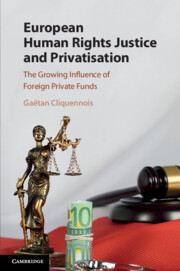Book contents
- European Human Rights Justice and Privatisation
- European Human Rights Justice and Privatisation
- Copyright page
- Contents
- Tables
- Foreword
- Acknowledgments
- Introduction
- Part I The Procedural Aspect of the Growing Influence of Private Foundations on the European Human Rights Justice System
- Part II The Substantive Dimension of the Growing Influence of Private Foundations on European Human Rights Justice
- 5 Effects of the Growing Influence of Private Interests on the Orientation of European Case Law
- 6 Effects of Private Litigation on Domestic Policies and International Relations: The Rise of Tensions between the EU, the US and Eastern Countries
- 7 The Relationships between Litigation Funded by Private Foundations and the Economic and Political Interests They Pursue
- Conclusion: Towards a Privatised Capture of Human Rights?
- Select Bibliography
- Index of Authors
- General Index
6 - Effects of Private Litigation on Domestic Policies and International Relations: The Rise of Tensions between the EU, the US and Eastern Countries
from Part II - The Substantive Dimension of the Growing Influence of Private Foundations on European Human Rights Justice
Published online by Cambridge University Press: 06 October 2020
- European Human Rights Justice and Privatisation
- European Human Rights Justice and Privatisation
- Copyright page
- Contents
- Tables
- Foreword
- Acknowledgments
- Introduction
- Part I The Procedural Aspect of the Growing Influence of Private Foundations on the European Human Rights Justice System
- Part II The Substantive Dimension of the Growing Influence of Private Foundations on European Human Rights Justice
- 5 Effects of the Growing Influence of Private Interests on the Orientation of European Case Law
- 6 Effects of Private Litigation on Domestic Policies and International Relations: The Rise of Tensions between the EU, the US and Eastern Countries
- 7 The Relationships between Litigation Funded by Private Foundations and the Economic and Political Interests They Pursue
- Conclusion: Towards a Privatised Capture of Human Rights?
- Select Bibliography
- Index of Authors
- General Index
Summary
We emphasise the most important effects of the concentration of litigation against certain Eastern countries: the politicisation of human rights and the rise of tensions between the EU, the US and nationalist regimes. We demonstrate how the growing role played by private foundations impacts international relations and contributes to the birth and development of a new Cold War between these countries. In particular, we show that through a combination of litigation and advocacy, NGOs can increase pressure on the European human rights system and on certain national states, maximise the extent to which the CoE monitors certain Eastern countries and, in the process, bring judicial and political changes, which may lead in the mid- and long-term to regime change in Russia and in other Eastern countries. The potential lack of compliance of some Eastern member states with reinforced monitoring allows private foundations to stigmatise them as unreliable rogue states responsible for the ECtHR backlog and for the general malfunction of the ECHR system. We draw on Eastern legislation and on EU and US foreign policy to analyse these political tensions.
Keywords
- Type
- Chapter
- Information
- European Human Rights Justice and PrivatisationThe Growing Influence of Foreign Private Funds, pp. 200 - 240Publisher: Cambridge University PressPrint publication year: 2020



